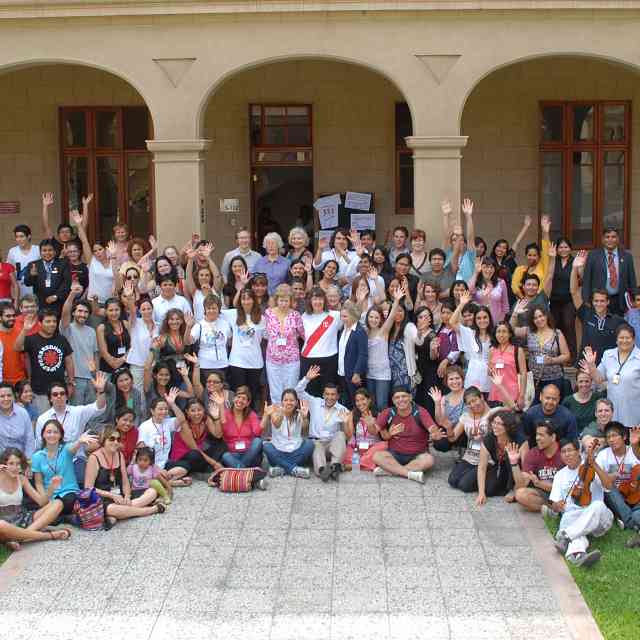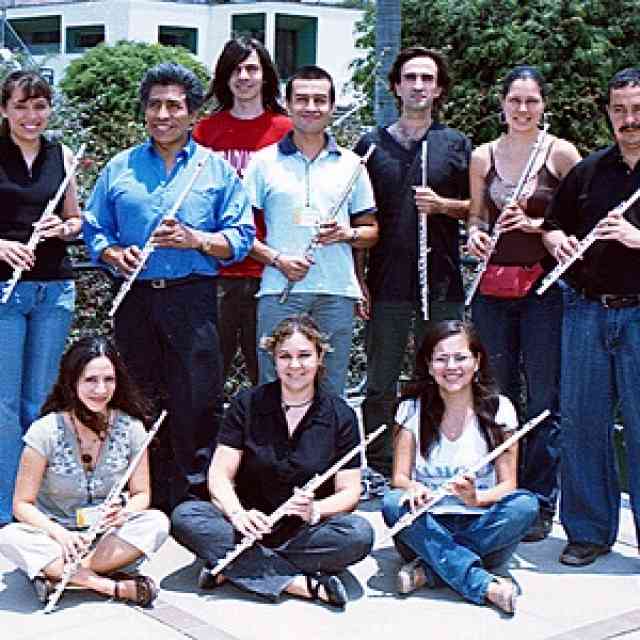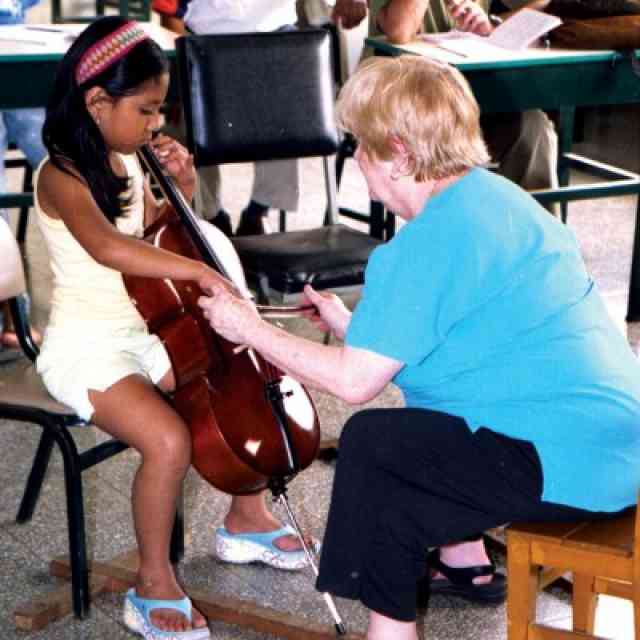By Caroline Fraser
Toward a bright and bold future: What does that mean? For me, it means nurturing those around us, reaching out beyond our own community to ensure that more and more children can benefit from the wonderful, all-embracing philosophy of Shinichi Suzuki. Knowing that developing every child’s potential is our responsibility, that a child’s development depends on the environment, and that we will shape that environment—this knowledge and our action change lives! With the 39th Suzuki International Festival held in Lima, Peru in January 2025, the Suzuki Association of Peru (ASP) sought to embody the Suzuki philosophy and extend it to our entire community.
Festival Overview
Our thanks first go to the school, “Colegio de la Inmaculada,” which gave us the use of its outstanding facilities. Thanks also to donations from a group of San Francisco Bay Area piano teachers, which allowed us to offer scholarships to teachers and students, and to the SAA for economic and administrative support. Our festival would not be possible without ongoing financial assistance.
Many thanks also to the ASP team: the hard-working ASP Festival Committee; director Luciana Castillo; administrator Maria Pia Beltrán; Festival coordinators Roberta Centurión and Annika Petrozzi; Nayat Cardenas, Kio Cardenas, Nico Ponce, and Caroline Fraser; to our ASP treasurer of more than 40 years, Adriana Paliza, who was helping virtually, and to all of the supporting office staff and the ASP Board of Directors.
This year, we offered several courses aimed at the wider musical community, thereby exposing new teachers and musicians to the Suzuki approach and to the work of our Association. These successful courses were: Alexander Technique, with Clara Sandler (Argentina/USA); Orchestral Conducting (2 levels), with Dario Dominguez (Argentina); Group Instruction, with José Marcio Galvao (Brazil); Recorder for Classroom Teachers, with Kathleen Schoen (Canada); and Early Childhood Music with Roxana del Barco (Peru).
In addition, we offered Filosofía with Caroline Fraser and unit courses in cello with David Evenchick (Canada), guitar with Diana Chagalj (Argentina), piano with Flor Canelo (Peru), and violin with Fernando Piñero (Argentina). Cello, recorder, piano, and violin students participated in master classes, group classes, workshops, and performances.
A Concerto for Four Pianos!
This year, four piano students of Flor Canelo from the Cusco Suzuki Association, Qantu, had the opportunity to perform a movement of Bach’s piano concerto for four pianos in A minor with a teachers’ orchestra. Here is what they wrote from Cusco.
Siwara Mercado Oróz writes:
With great affection, I thank the teachers and the association for the scholarship, which made my attendance at the festival much easier. I had a very enriching experience thanks to the organization and the teachers from whom I learned immensely. It is also unforgettable to have shared the stage with the teachers’ orchestra, and how my pianist friends and I were welcomed by them and the community. They were beautiful days.
Ana Sofia writes:
I would like to thank the entire Suzuki Association of Peru for this wonderful experience. Having had the opportunity to participate with my friends for the first time using a much more advanced book from the Method has been very interesting, and I learned many new topics that are incredibly important to me. I deeply appreciate all the amazing teachers who taught us with so much patience and dedication. I am also profoundly grateful for the great opportunity we had to perform Bach’s Concerto for Four Pianos. We were able to grow so much in such a short time, and I felt very welcomed. I’m also left eager to continue learning more with them. This is why the scholarship they provided us has been so special, as without it, none of this would have been possible. It greatly facilitated access to this experience.
Juan Pablo writes:
It was an incredible and beautiful experience, filled with adrenaline and laughter everywhere. Obviously, I feel very grateful for the support we received, as I will undoubtedly treasure this amazing experience, surrounded by great musicians and people, until the day I die.
Talía Beltrán writes:
The Suzuki 2025 festival has been one of the experiences I have enjoyed the most this summer. The scholarship granted by the Association made it possible to travel with the four-piano project which I have with my friends. This project grew in the company of the Suzuki teachers’ orchestra and with Dario, the conductor of the orchestra. At the same time, having the opportunity to take the other courses, such as the master classes, where we were able to analyze and discuss in greater depth the pieces of the later piano books, understanding the manner of interpretation at a more advanced level and finding enjoyment in it, enriched this whole experience.
Congratulations, Talía, Siwara, Ana Sofia, Juan Pablo, and your teacher, Director of Qantu, Flor Canelo! This spectacular performance took place during a final concert when, in addition, all forty piano students played solos in under an hour. The evening and festival ended with a heartfelt performance of Astor Piazzolla’s Adios Nonino, given by Unit Three violin teacher participants and friends, directed by Fernando Piñero.
Views from the Festival
This in-person festival was a wonderful coming together of many old friends, and it was an excellent opportunity to make new ones. In total, 280 students with their parents and 120 teachers attended. We had participation from Argentina, Brazil, Bolivia, Chile, Colombia, Ecuador, Guatemala, Paraguay, and many regions of Peru—from the Andes, the jungle, and the coast.
We held a one-day, well-attended Teacher’s Encuentro, in which we shared our dreams for the future. Yes, our “bright and bold future”! It was exhilarating to see many teachers taking the lead in presenting ideas for future collaborative projects, some of which are already on their way to fruition. Direct results of that one-day get-together include a National ASP Workshop that will take place in Huánuco, a city in the Peruvian Andes, close to the jungle, in October; a celebration of 20 years of Suzuki in Paraguay will take place in Asunción in August, organized by an international group of teachers, “Promesa”; and the ASP Peru Festival Committee (members living in Brazil, Finland, USA, Peru) is already working toward celebrating the 40th Suzuki International Festival in January 2026. In all these events—in Huánuco, in Asunción, and in Lima—Filosofía will be one of the course offerings. This course changes hearts and changes lives.
The remainder of this article shares some views from teachers and participants at the 39th Suzuki International Festival. First, Ruben Solano, a piano and recorder teacher from Huancavelica, high in the Peruvian Andes, writes:
I want to thank those responsible for the financial help via scholarships for my process of training and musical education in the Suzuki Method. I am the seventh child of a large family of eleven siblings, none of whom are musicians, not even my parents. My passion for music began at the age of twelve when I first saw a piano at my high school; at the age of fifteen, I began to have piano lessons with Father Carlos López. When I finished high school, one of my dreams was to study music professionally, but it was not possible due to lack of economic resources, because of the size of my family.
In 2009, I was teaching recorder in my town, Huancavelica, and thanks to Father William López, a member of the ASP, I was invited to take the Suzuki Philosophy course in Lima, made possible through a scholarship from the ASP. From that moment, my wonderful musical life began. Later, I took the piano courses through Book Five, and recorder and cello Book One. For each course, I had financial support from the ASP, for which I am eternally grateful. From that moment on, in Huancavelica, Peru, I have been spreading the Suzuki philosophy, in recorder and piano.
I am thankful that, in 2014, two of my recorder students and I traveled to the SAA Biennial Conference in Minneapolis, USA. My students performed in the Latin American Ensemble. It was an unimaginable and unthinkable experience for my students and for me. We also had financial support from the SAA.
Thank you very much to the Suzuki community and benefactors for the financial support you provide to the teachers. I especially thank you for the support you gave me; you changed my life into a musical life. Thank you!
Daniel Manriquez writes from Iquitos, a city in the Peruvian Amazon jungle in the department of Loreto, who came to Lima with a delegation of seventeen students and parents.
Receiving the scholarship the Suzuki International Festival 2025 has been a transformative opportunity both for my professional development and for the growth of my orchestra project in the department of Loreto. The orchestral management strategies I learned have helped me to optimize the processes of my project in Loreto, achieving greater cohesion in the group and a more solid advance in the musical level of the participants. The Suzuki approach, with its emphasis on learning from empathy and motivation, has enriched my teaching methodology, allowing me to better connect with my students and foster a more inclusive and stimulating musical environment. I am deeply grateful to the Suzuki International Festival Lima 2025 for this invaluable opportunity, which will undoubtedly continue to have a positive impact on my work and on the lives of many young musicians from Loreto.
Finally, Yuko Hirama, a Suzuki piano teacher from San Francisco, attended the Peru Festival for the first time, giving master classes and observing courses and performances.
Yuko writes:
A group of students played recorders so beautifully. Many came from a seminary in Huancavelica, a remote city in the high Andean mountains. Padre Roosevelt teaches there using the Suzuki approach, creating the next generation of musicians and possible teachers. I saw people giving back to the community what they had received.
I saw something most beautiful at the Suzuki Peru festival. Music traveled across borders. Teachers from various Latin American countries and students from all over Peru were all together making beautiful music. Their families watched proudly.
Suzuki programs existed in a few Latin American countries in the 1970s. When the Suzuki Association of Peru started to offer training through the annual Peru International Festivals (39 festivals ago!), the Suzuki philosophy spread rapidly, thanks to scholarships offered to students and teachers. As teachers from other Latin American countries traveled to Peru, thanks also to economic support, more countries started to organize festivals and training programs. Dr. Suzuki would have been happy to see students and teachers making music together at the Peru Festival. He wanted to make the world better through music.








